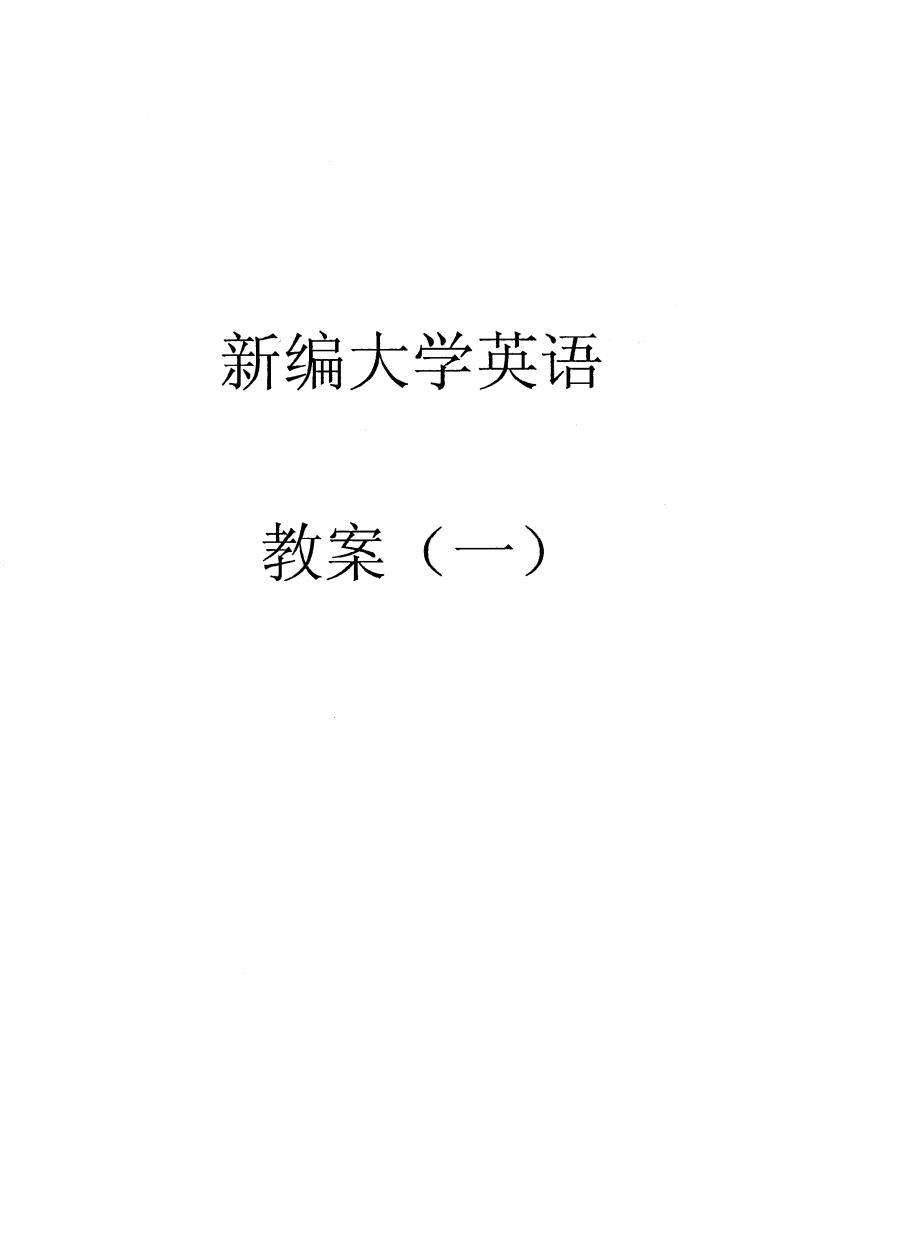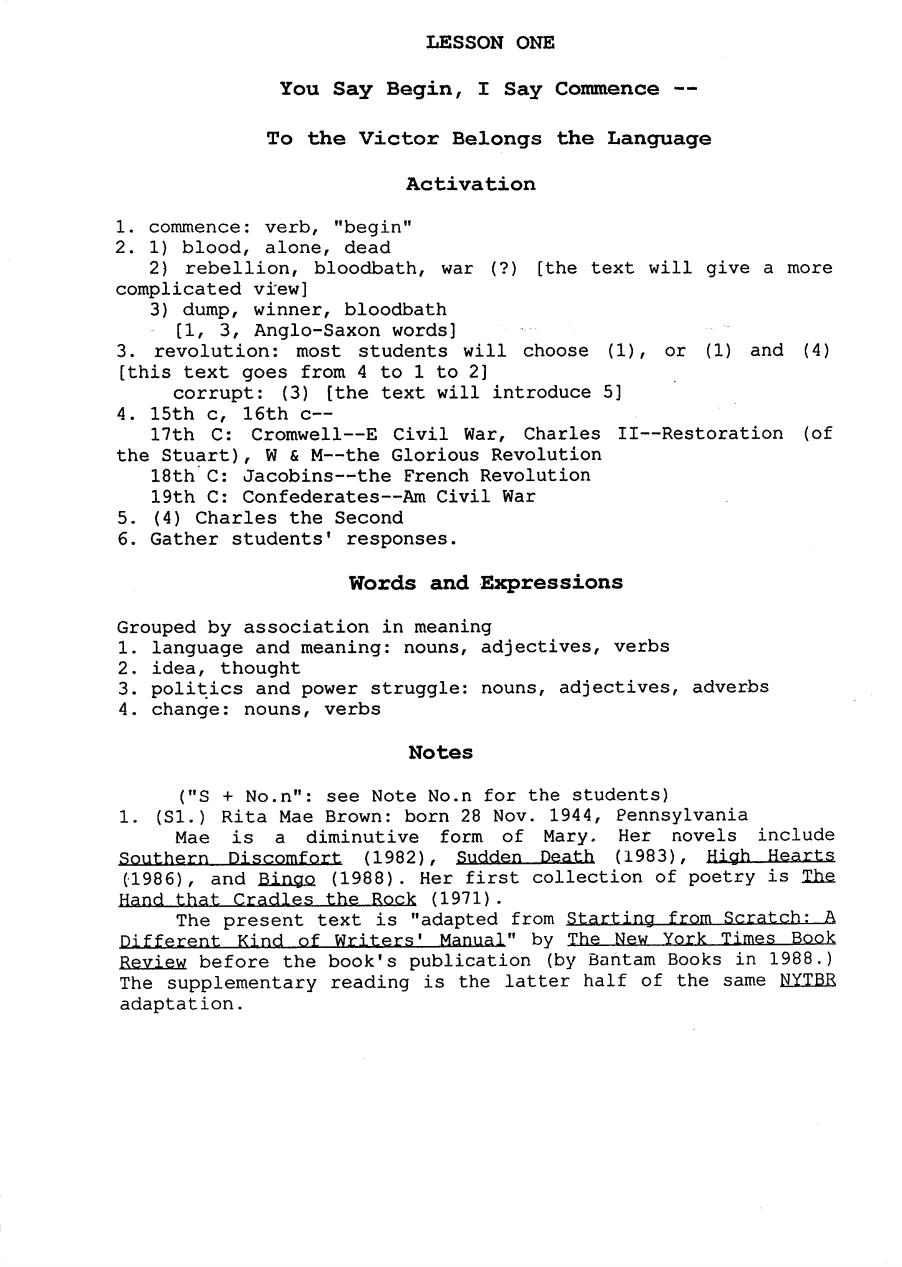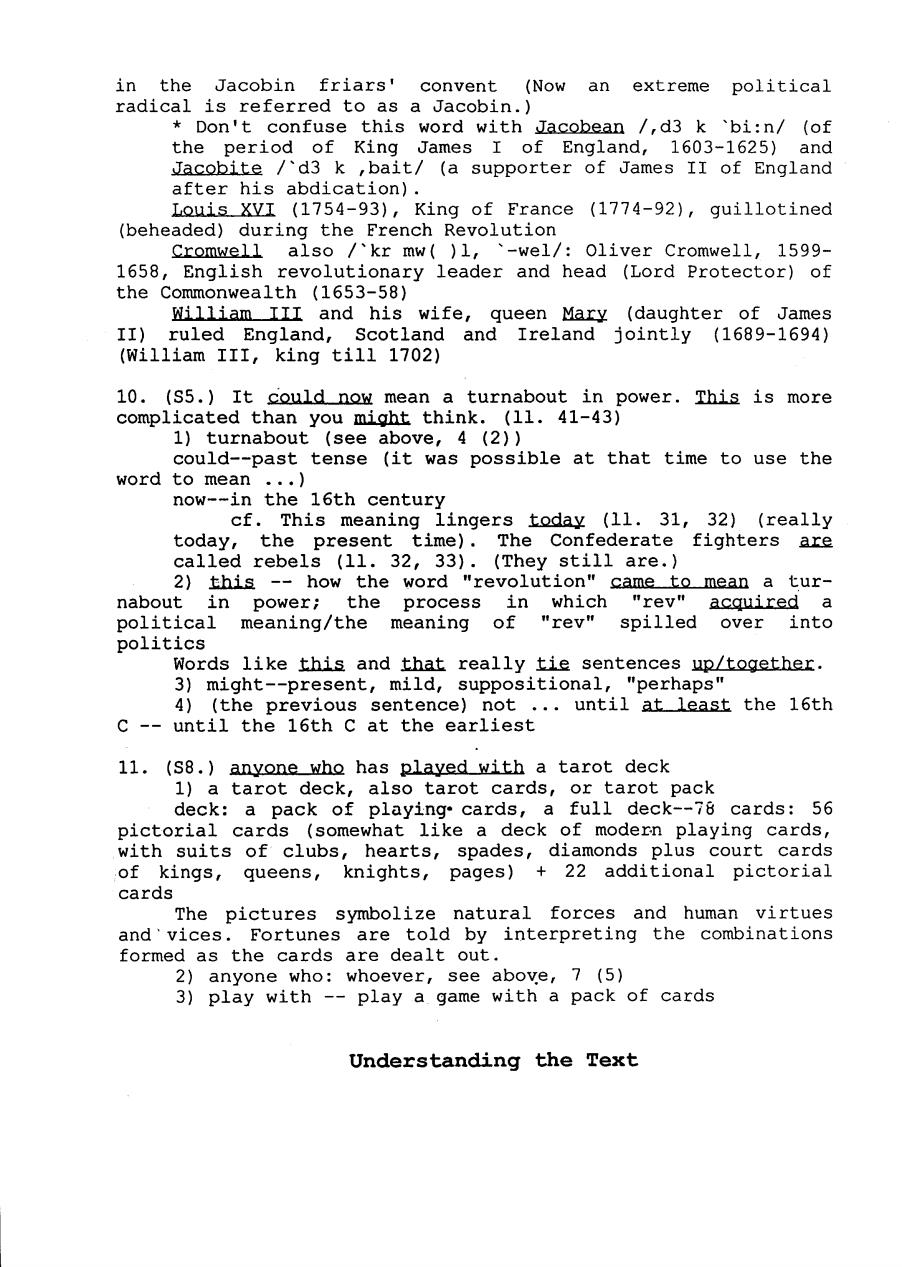
新编大学英语 教案(一)

LESSON ONE You Say Begin,I Say Commence - To the victor Belongs the Language Activation 1.commence:verb,"begin" 2.1)blood,alone,dead 2)rebellion,bloodbath,war (?[the text will give a more complicated view] 3)dump,winner,bloodbath [1,3,Anglo-Saxon words] 3.revolution:most students will choose (1),or (1)and (4) [this text goes from 4 to 1 to 2] corrupt:(3)[the text will introduce 5] 4.15thc,16thc-- 17th C:Cromwell--E Civil War,Charles II--Restoration (of the Stuart),W&M--the Glorious Revolution 18th C:Jacobins--the French Revolution 19th C:Confederates--Am Civil War 5.(4)Charles the Second 6.Gather students'responses. Words and Expressions Grouped by association in meaning 1.language and meaning:nouns,adjectives,verbs 2.idea,thought 3.politics and power struggle:nouns,adjectives,adverbs 4.change:nouns,verbs Notes ("S No.n":see Note No.n for the students) 1.(S1.)Rita Mae Brown:born 28 Nov.1944,Pennsylvania Mae is a diminutive form of Mary.Her novels include Southern Discomfort (1982),Sudden Death (1983),High Hearts (1986),and Bingo (1988).Her first collection of poetry is The Hand that Cradles the Rock (1971). The present text is "adapted from Starting from Scratch:A Different Kind of Writers'Manual"by The New York Times Book Review before the book's publication (by Bantam Books in 1988.) The supplementary reading is the latter half of the same NYTBR adaptation

2.Notice the use of "can"in the following sentences:it expresses possibility in an abstract way,unlike "may/might/ could"which mean "perhaps"(that is,talking of possibility in a more realistic way). It can sweep by your ear and ..suggest hidden meanings, preconscious associations.(11.7-9) This can yield amusing results.(1.28) It can be dismissed as a rebellion.(11.33,34) 3.(S2.) 1)that was how it was used--that:the previous sentence, "revolution"means a turning around (notice "means":it is still used in this sense today). paraphrase:a turning around was the sense in which the word "revolution"was used (in the 14th century);a turning around was what the word "revolution"meant (in the14 th century)· You can recast that to mean...--that:what has just been said,i.e.,revolution was personal. 4."Revolution"means a turning around (1.18). 1)"turning"--more like a noun (as it is preceded by "a")than a gerund but not yet a full noun (as it.is still modified by an adverb "around") Can "a"be omitted here?--No.A restricts the action: (making)one complete turning--a circular course starting from one point and returning to the same point. cf."R"means turning around.(grammatically correct:The -ing phrase is object of the sentence.)The emphasis is on the action,or the concept of turning around (and around and around). 2)"around"adv.esp in AmE,="round"(in BrE) Around can be used in several senses:so as to move in a circle;so as to face the opposite direction,etc. cf.'turnabout (1.42)n.an act of turning in a different or opposite direction (about-face:.in AmE,a noun meaning a complete change to the opposite position,direction or opinion) 3)Also notice:a renewal of war (11.25,26),a resistance to lawful authority (11.27,28)(anact of making war again of resisting...). Without a,the emphasis will be on the concept rather than one such action. 5.(S3.)loaded:a loaded question,a loaded statement 6.(S4.) l)as(a very formal use),does(apro-verb,代动词)

e.g.The word "war"carries cultural as well as political meaning,as does "peace". "Love"is an Anglo-Saxon word/old English word,as are "help"and "begin". 2)We will often come across "pool"in later texts.So at present,concentrate on this one use in the text. In English there are two words spelt "pool",but they are different not only in meaning but also in origin.One "pool"(a pond,a puddle,or a swimming pool)comes down from old English,and the other "pool"enters English from Latin through French.It means essentially a putting together of things (money,goods,workers,etc.)for some common purpose or for common use,or (as in "word pool")a common supply of things. *S5 (this)--see below,10 7.(S6.)Whichever side won called the losers rebels --they, the winners,being the repositories of virtue and more gunpowd- er. 1)paraphrase:No matter which side won the war,the winners called the losers rebels as they now came to represent what was good and right and lawful as well as power and authority. 2)The participle phrase (being)indicates cause,but the dash suggests something added afterwards,a deviation from the original definition of the word (redefining). 3)ironic juxtaposition of virtue and gunpowder more gunpowder:stronger,more powerful,actually the cause of their being able to redefine language and to call the other side rebels ("virtue":suspicious?) "amusing results"(1.28):language of conquerors 4)repository:storehouse (place,concrete)of virtue (quality,abstract) cf.the road map (image)of a culture (more abstract) 5)"whoever wins the war"--also a subject clause, whoever.anyone who (anyone,no matter who),or any side that (any side,no matter which) e.g.Whoever has played with a tarot deck knows the image of the wheel of fortune well. 8.Since the North won that war,it can be dismissed as a... (11.33-35) since conj.indicating cause (used only of known facts) e.g.They now call themselves lawful since they won the war and have since (adv.indicating time)been in power. 9.(S7.)Jacobins--members of a society of radical democrats in France during the Revolution of 1789;their meetings were held

in the Jacobin friars'convent (Now an extreme political radical is referred to as a Jacobin.) Don't confuse this word with Jacobean /d3 k bi:n/(of the period of King James I of England,1603-1625)and Jacobite /d3 k ,bait/(a supporter of James II of England after his abdication). Louis XVI (1754-93),King of France (1774-92),guillotined (beheaded)during the French Revolution Cromwell also /'kr mw()1,-wel/:oliver Cromwell,1599- 1658,English revolutionary leader and head (Lord Protector)of the Commonwealth (1653-58) William III and his wife,queen Mary (daughter of James II) ruled England,Scotland and Ireland jointly (1689-1694) (William III,king till 1702) 10.(S5.)It could now mean a turnabout in power.This is more complicated than you might think.(11.41-43) 1)turnabout (see above,4 (2)) could--past tense (it was possible at that time to use the word to mean··,) now--in the 16th century cf.This meaning lingers today (11.31,32)(really today,the present time).The Confederate fighters are called rebels (11.32,33).(They still are.) 2)this --how the word "revolution"came to mean a tur- nabout in power;the process in which "rev"acquired a political meaning/the meaning of "rev"spilled over into politics Words like this and that really tie sentences up/together. 3)might--present,mild,suppositional,"perhaps" 4)(the previous sentence)not ..until at least the 16th C--until the 16th c at the earliest 11.(S8.)anyone who has played with a tarot deck 1)a tarot deck,also tarot cards,or tarot pack deck:a pack of playing.cards,a full deck--78 cards:56 pictorial cards (somewhat like a deck of modern playing cards, with suits of clubs,hearts,spades,diamonds plus court cards of kings,queens,knights,pages)+22 additional pictorial cards The pictures symbolize natural forces and human virtues and'vices.Fortunes are told by interpreting the combinations formed as the cards are dealt out. 2)anyone who:whoever,see above,7 (5) 3)play with --play a game with a pack of cards Understanding the Text